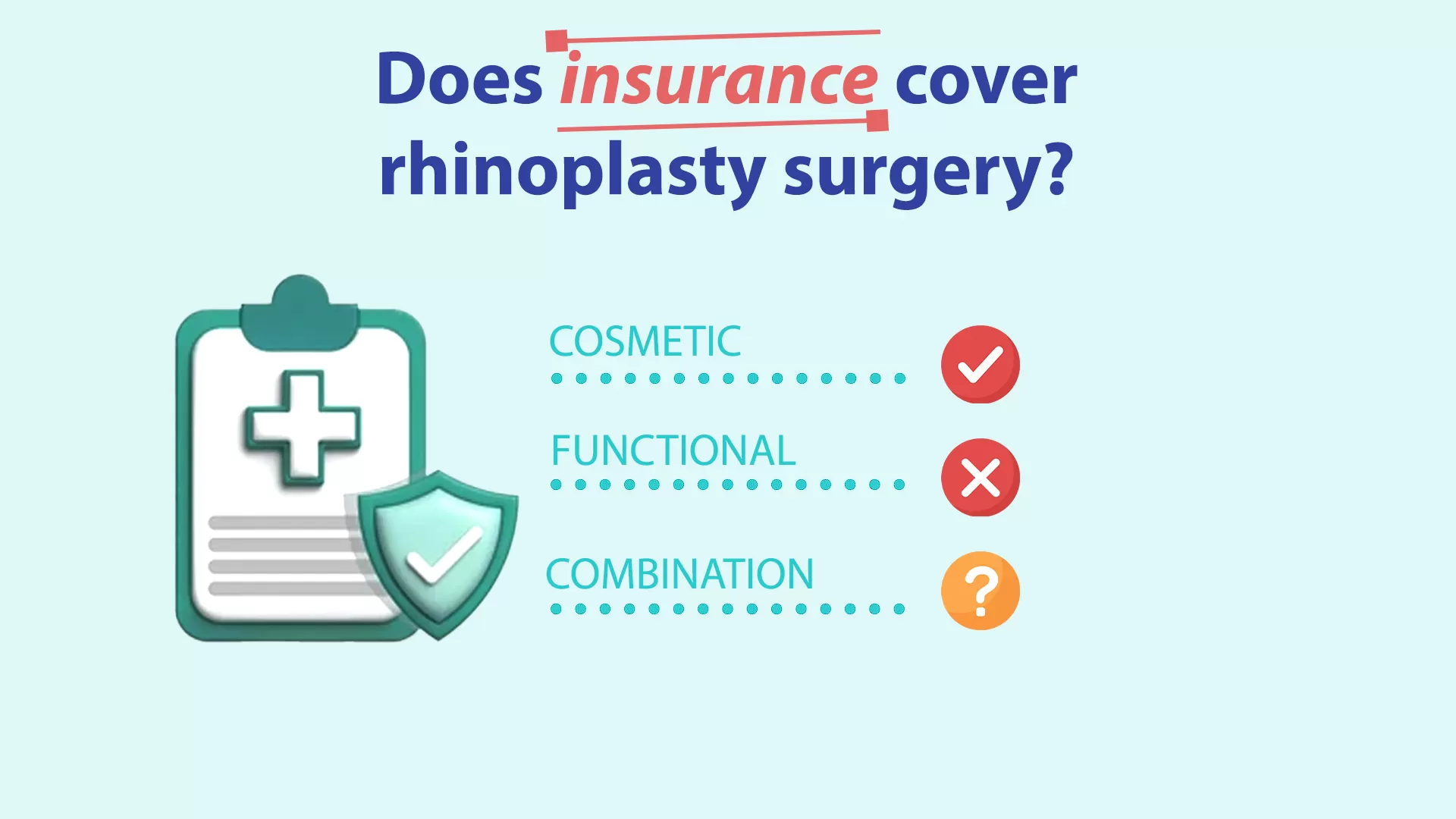
When it comes to rhinoplasty, also known as a nose job, one of the important questions people ask is “Will insurance cover the surgery?”
Generally, people get a nose job for two main reasons: cosmetic and medical. Whatever your reason for getting a nose job is, the financial aspects of getting a nose surgery are a significant consideration.
The first thing we should know is that cosmetic rhinoplasty surgeries are not covered by insurance. The reason is clear: a cosmetic nose job is a surgery that is not deemed medically necessary and it is the person’s choice. If you want to undergo this surgery to improve symmetry, reshape your nose, or make any other changes to reach your personal preferences, then the procedure is considered an aesthetic rhinoplasty and it is not covered by your insurance. Insurance will cover your rhinoplasty procedure if there’s a documented nasal fracture that has caused significant distortion of the nose. Therefore, if your surgery includes for example improving the airway and the ability to breathe easily through the nose, insurance will cover it. To get the surgery covered, you must have a thorough physical examination and breathing history before the potential for insurance coverage can be determined.

The cost of a rhinoplasty or nose job can be different depending on the extent of the procedure, the anesthesia fees, the surgeon’s fees, and the facility fees. The average price of nose surgery is around $5,400 to $5,500, which doesn’t include anesthesia, operating room facilities, or other related expenses. On the other hand, a rhinoplasty cost with insurance will be different. You may be able to use insurance if the surgery is necessary to improve your nose’s function or a related underlying health condition.
The price of rhinoplasty with insurance may be different depending on your insurance policy, your co-pay, your deductible, and your out-of-pocket maximum. Some insurance companies may just cover the portion of the procedure that is related to the functional issue, and not the cosmetic part. For instance, if you have a deviated septum that affects your breathing, your insurance covers the price of a septoplasty, which is the correction of the septum, but not the cost of a rhinoplasty, which is the reshaping of your nose. In this case, you may have to pay an additional fee for the rhinoplasty part of the operation.
One way to estimate the price of a nose job with insurance is to ask the surgeon for a breakdown of the fees for each part of the procedure, and then contact the insurance company to find out how much they will cover for each part. In addition, you can ask the surgeon if they offer any financing options or payment plans for the part of the operation that is not covered by insurance. Some surgeons may also offer discounts or specials for rhinoplasty, so it’s worth doing some research and comparing prices before making a decision.
The most common medical problems corrected by rhinoplasty typically qualify for insurance coverage include:
1.Deviated septum
2.Old injuries cause structural deformities that can affect breathing or respiratory health.
3.Birth defects
4.Defects that cause intense or persistent allergy symptoms, or sinus infections.
Some factors that can affect the rhinoplasty cost are:
1.Many rhinoplasty surgeons don’t accept health insurance, and therefore you may need to pay for your procedure upfront and then apply for reimbursement from your insurer if it is a covered benefit.
2.Costs and expenses are higher in some areas of the country than in other areas. Patients should research location costs to help narrow down the most cost-effective nose job surgeon for their needs.
3.There are also some facility-related expenses to consider when contemplating nose surgery, like surgeon fees, medical tests, anesthesia, and prescription medications.
4.The amount of work needed to modify the appearance of the nose matters. Some individuals only need minor adjustments; other people may need more extensive or invasive work. Minor or small-nose jobs are generally less expensive compared to procedures that require more work.
5.The purpose of the procedure matters. Generally, rhinoplasties are classified as cosmetic procedures and are not usually covered by your insurance. However, if nasal anatomical abnormalities or irregularities compromise your health, your insurer may authorize complete or partial coverage for the surgery.
If you plan to use insurance to help offset any out-of-pocket expenses, you will need to contact your insurer to inquire about your benefits. But first, you will need to know if your nose surgery is strictly for cosmetic reasons or includes surgical revisions to any interior surfaces or structures. If your procedure involves interior nasal remodeling, it is likely to qualify as a functional or medical rhinoplasty.
It is vital for anyone contemplating a nose surgery to evaluate all options, regardless of cost. Candidates have the best outcomes with a credible, trustworthy, and reliable board-certified rhinoplasty surgeon.
Will insurance cover rhinoplasty for the deviated septum?
In most cases, insurance will cover a procedure to correct a deviated septum, which is also known as a septoplasty. Insurance providers are more likely to cover the surgery if a medical professional deems the operation necessary to alleviate these problems.
A deviated septum is a state in which the wall that separates your two nasal passages, known as the septum, is deviated, or shifted, to one side. This deviation obstructs the nasal passages and causes difficulty breathing. Living with a deviated septum and the associated breathing issues can be inconvenient, but there is an effective treatment option in the form of rhinoplasty for a deviated septum.
Rhinoplasties that are for a specific functional purpose, such as improving breathing by fixing a deviated septum, are usually covered in full by insurance companies. Insurance coverage can vary widely depending on the person, the procedure, the insurance company, the healthcare provider, and more.
Although many of the functional rhinoplasty procedures (like septoplasties) will be covered by insurance, not all aspects of the procedure may be covered. Make sure to ask about anesthesia fees, overnight fees, and fees for pre-operative and post-operative visits. Knowing what fees you will be responsible for before the surgery will let you plan and eliminate the chance of surprise bills after the fact.

To get insurance to cover your rhinoplasty, you will need to follow these steps:
1.Determine the reason for the rhinoplasty: If you want to change the shape of your nose for aesthetic reasons, like improving your appearance or self-esteem, then insurance won’t cover the procedure. However, if you need a nose job for functional reasons, such as to correct breathing problems caused by injury, deformity, or nasal obstruction, then insurance may cover some or all of the expenses of the surgery. Therefore, you’ll need to provide evidence that the procedure is medically necessary and not just for cosmetic enhancement.
2.Consult with a qualified surgeon who specializes in rhinoplasty: The surgeon will evaluate your appearance and nasal function, and then determine if you’re a good candidate for the operation. The surgeon will also explain the benefits, risks, and alternatives of the procedure, and answer any questions you may have. In addition, the surgeon will provide you with a written estimate of the fees for the operation, which can include the surgeon’s fees, the anesthesia fees, and the facility fees.
3.You’ll need to contact the insurance company and find out if rhinoplasty is a covered benefit under your plan. You will need to submit a pre-authorization letter from the surgeon, along with any supporting documents, including medical records, photos, or test results, that show that the procedure is medically necessary and not just for cosmetic purposes. The insurance company will review your case and decide if they’ll approve or deny the coverage. Depending on your insurance company and policy, this process may take some weeks or months.
If your insurance company approves the coverage, you’ll need to schedule the operation with your surgeon. In addition, you should know how much of the cost you will have to pay out of pocket, such as your co-pay, your deductible, or your out-of-pocket maximum. You’ll need to prepare for the surgery, such as by following the pre-operative instructions, arranging for transportation and recovery, and taking time off from school or work.
You’ll need to keep track of your bills and receipts and submit any claims or reimbursements to the insurance company. You may also need to have a follow-up visit with the surgeon to evaluate the outcome and your satisfaction.
You may be one of those patients who want to undergo a nose job for cosmetic reasons, while you are not able to pay for the procedure in your homeland. Having your surgery in Iran gives you this opportunity to get your treatment at a lower price compared to other countries. Therefore, Iran is the best option even for people who want to get this surgery for medical reasons. Due to the low cost of the procedure, they don’t need their insurance. The low costs of rhinoplasty surgeries in this country are because of some reasons which include:
1.The low currency in Iran against other countries
2.The high number of surgeries that are performed every year,
Therefore, you can benefit from both rhinoplasty and rhinoplasty revision at the best quality while paying low and saving money. You can also consult with our surgeons about your goals since many professional surgeons are settled in Iran. You can reach medical tourism in Iran to help you with arranging and the questions you have about the surgery.
To have plastic surgery in Iran, you can consult with Ermateb, a medical tourism facilitator located at the Iran University of Medical Science. Our team’s goal is to help international patients, especially patients from the Middle East, to receive and enjoy the best nose surgery in Iran. To get more information and arrange your treatment in Iran, you can contact us via WhatsApp, or you can also fill out the online form on our website.

